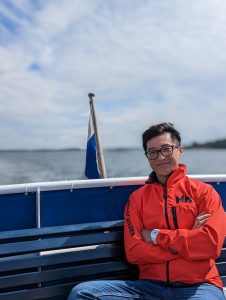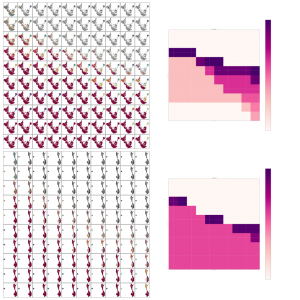 Ryan is from Windsor, Ontario and just finished his fourth and final year of undergraduate studies at U of T’s David A. Dunlap Department of Astronomy & Astrophysics, specializing in astronomy and physics with a major in physics and minor in math.
Ryan is from Windsor, Ontario and just finished his fourth and final year of undergraduate studies at U of T’s David A. Dunlap Department of Astronomy & Astrophysics, specializing in astronomy and physics with a major in physics and minor in math.
Outside of work and his studies, Ryan can often be found at home cooking what’s left in the fridge or out in the wilderness. He is currently taking a gap year in Montréal and is looking forward to pursuing graduate studies in astronomy and astrophysics in the future.
What made you decide to participate in SURP?
I wanted to participate in SURP to continue my research work from AST425 (research course in astronomy) and bring it all together into a publishable result. This was the perfect opportunity to explore different paths and tie–up any loose ends within the project while learning more about the research environment and technical skills used in academia.
Can you tell us about your research project?
My project was about locating stars that were kicked out of the core of exorbitantly old star clusters. We first identified stars that belonged to the parent star cluster, then matched distant stars to the parent star cluster through a chemical-based analysis aided by machine learning algorithms and astro-statistics. In the end, we created an automated, guided process for identifying both parent cluster member stars and escaped stars for any star cluster. We are currently finishing up a paper draft for submission detailing this process and creating a catalogue of these escaped stars for 25 different star clusters.
What is your favourite thing about SURP?
My favourite thing about SURP was the flexibility in my schedule to work whenever I wanted to. It made it easy to work around motivation shifts and allowed me to work efficiently and creatively. The flexibility allowed me to schedule in free time to enjoy the summer and take breaks from the project so that I always came back fresh and invigorated.
Can you explain how SURP has been different from your undergrad work?
A lot of undergraduate work was course–focused, where the goal was to answer a question of a problem set or understand the basis behind some concept in math and physics. SURP gave us the opportunity to apply what we learned while picking up new skills from all sorts of different fields ranging from computer science to chemistry to statistics. It also gave us the freedom to approach a research question from any angle. Besides some guidance from our supervisors, how we tackled a problem was unique and had almost endless possibilities to explore.
What are your plans for the future?
I recently moved to Montréal to take a year or two away from school and explore what there is to learn from industry. I plan on applying for grad school one day and continue working non-nine-to-five jobs.
The Dunlap Institute for Astronomy and Astrophysics at the University of Toronto is an endowed research institute with over 80 faculty, postdocs, students, and staff, dedicated to innovative technology, ground-breaking research, world-class training, and public engagement.
The research themes of its faculty and Dunlap Fellows span the Universe and include: optical, infrared and radio instrumentation, Dark Energy, large-scale structure, the Cosmic Microwave Background, the interstellar medium, galaxy evolution, cosmic magnetism, and time-domain science.
The Dunlap Institute, the David A. Dunlap of Astronomy and Astrophysics, and other researchers across the University of Toronto’s three campuses together comprise the leading concentration of astronomers in Canada, at the leading research university in the country.
The Dunlap Institute is committed to making its science, training, and public outreach activities productive and enjoyable for everyone of all backgrounds and identities.

